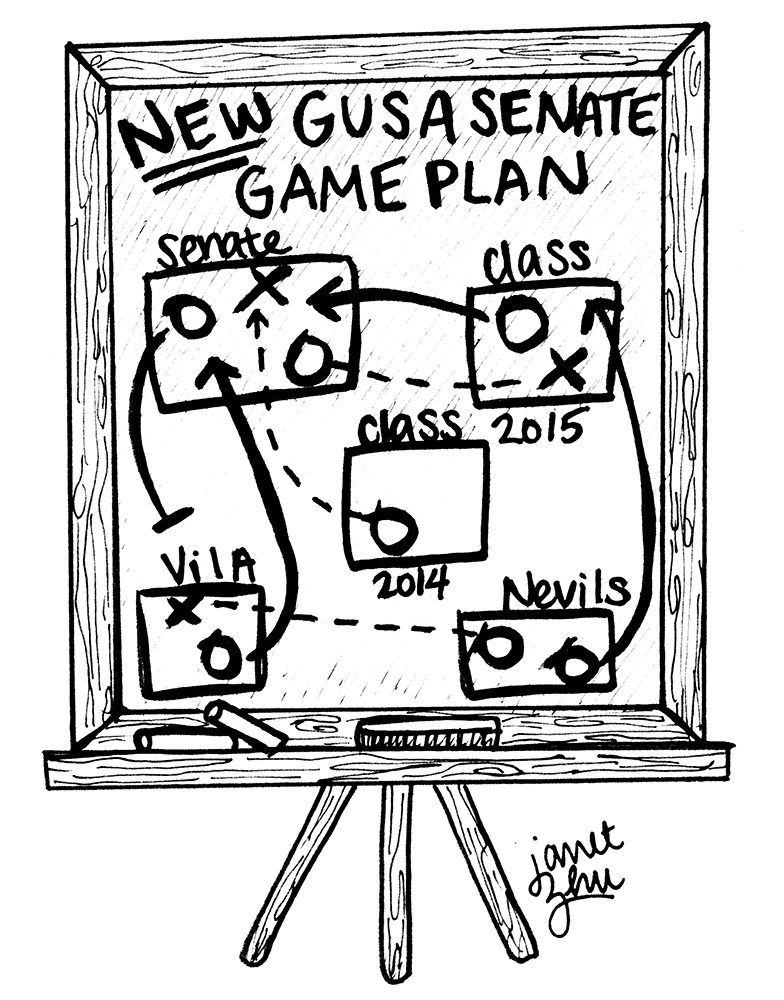 The Hilltop is flooded with flyering and door-to-door campaigning around the time of the Georgetown University Student Association senate races. Last week, one only had to walk through a heavily canvassed Red Square to feel the election enthusiasm. With this in mind, GUSA’s mission of representing student interests would be furthered by two structural reforms.
The Hilltop is flooded with flyering and door-to-door campaigning around the time of the Georgetown University Student Association senate races. Last week, one only had to walk through a heavily canvassed Red Square to feel the election enthusiasm. With this in mind, GUSA’s mission of representing student interests would be furthered by two structural reforms.
The past four years have seen positive strides with respect to the GUSA senate. With an increasingly visible presence on campus, the senate has recently been more effective in vocalizing important student concerns and maintaining dialogue with constituents. A notable redistricting effort two years ago sought to better represent each class by adding additional at-large seats. Within this trend toward improving infrastructure, the GUSA senate should consider proportioning representatives based on class year instead of residence.
The problem with housing-based allocation is twofold. First, relatively little correlation exists between the biggest campus issues worked on in the GUSA senate and residence-based concerns. When the predominant topics raised in the senate are university-wide — such as renovations for Kehoe Field and funding for student groups — students gain little from having a representative whose common identity is their housing location. Geographic representation makes sense with permanent residences; at a college, the distinction is by and large arbitrary.
Second, most students switch residences four times in as many years, whereas they of course continue through their time on the Hilltop with the same class. This, and the nature of housing selection, can limit the senate’s pool of talent. If a disproportionate number of competent candidates end up living in Village B, for example, and none are placed in Henle Village, the senate stands to lose its most motivated contributors from unnecessary competition among the most qualified. While in national politics it can be reasonably assumed that representatives have strongly vested interests in their home jurisdiction, this system lacks logic on a campus with residences that representatives call home for less than a calendar year.
A class-year-based electoral system, in which each voter would rank a certain number of class representatives on the ballot instead, would work to alleviate these concerns. The switch would not hinder residency-specific campaigning — seniors, for example, would likely still run on off-campus issues since the bulk of their constituency resides there — but it would link representatives to their constituencies with a more binding and lasting tie.
During the senate voting process, a short bio added to each candidate’s name on the HoyaLink ballot would have a tangibly positive effect on elections. While platform information certainly exists in external sources — one being online surveys conducted by The Hoya — the influence of name-recognition and arbitrary voting are pervasive in GUSA politics. As important as the senate is to representing student interests, many students are unable or unwilling to devote time to researching candidates. The electoral process must therefore make an active effort to inform its voters. A simple line of text submitted by the candidates outlining their platform would allow them to better distinguish themselves to the average student. This is something The Hoya has called for in the past, and we continue to see its immediate practicality.
Condensing one’s platform into such a brief blurb could be said to trivialize potentially important candidate distinctions. But compared to the current lack of any information on the ballot, there is value in any method to guide students to vote based on substance.
For student government to accurately represent student interests, its leaders must constantly work to improve the electoral system. Moving to better align senate representation with interest and to deepen the substance of the voting process are two ways in which GUSA can strengthen its service to the student body.













